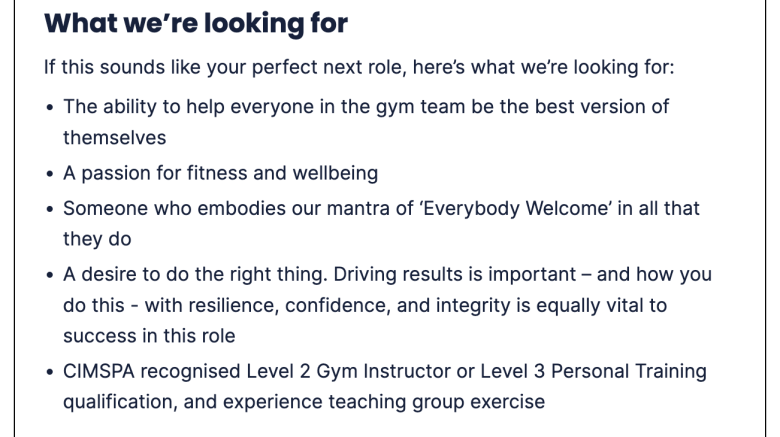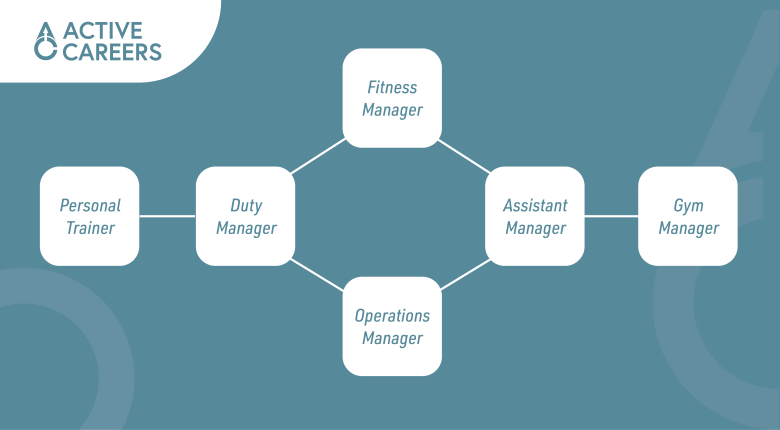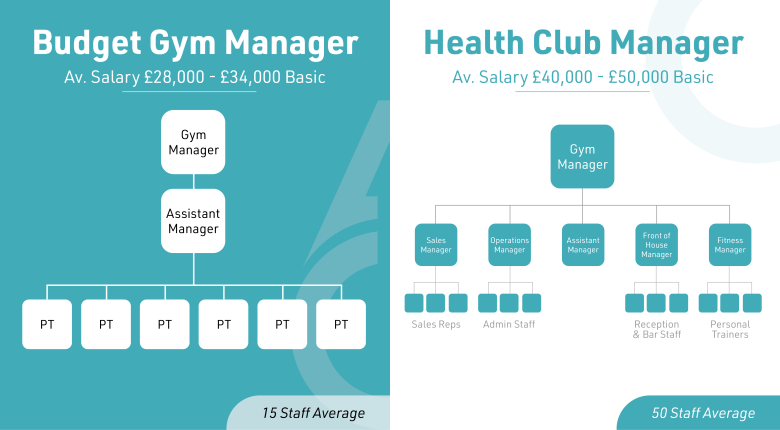
How to become a Gym Manager
How to become a Gym Manager: Step by Step Guide
In this guide we will show you how to become a gym manager step by step, including what qualifications you need, skills required, and how to land your first gym manager position.
The Role of a Gym Manager & Skills Needed to Be Successful

When deciding if becoming a gym manager is the right career path for you, a good starting point is to evaluate the core responsibilities and duties. See below common tasks associated with most gym manager roles:
Financial Planning & Budgeting
Gym Managers have to financially plan and forecast for the gym’s success. This includes projecting growth across multiple revenue streams such as gym membership sales and secondary revenue streams like merchandise and supplement sales.
Member Engagement and Retention
You will strategise and implement member retention schemes to improve the gym’s member attrition rates. You will also monitor and report on members' satisfaction levels to drive high levels of customer service within your gym staff.
Inventory Management & Equipment Maintenance
You will oversee inventory checks and ensure the gym is fully stocked with the appropriate supplies as well as liaising with gym equipment engineers when apparatus breaks down.
Staff Management & Recruitment
Depending on the size of the health club or gym you will manage a large number of staff members and motivate them towards their targets. You will also be responsible for recruitment, including hiring Personal Trainers and providing ongoing training and support to all heads of departments.
Localised Marketing
You will promote and market the gym within your immediate community through various localised marketing strategies such as leafleting, developing business to business relations, organic social media campaigns and advertisements within the gym itself.
Health and Safety & Compliance
You will conduct, daily, weekly and monthly health ans safety and compliance checks to ensure the safe running of the gym. This extends to equipment checks, COSH checks,
Reporting & Collaborating
You will report to a Regional Manager or Fitness Director on a whole host of areas across the gym, including finances, payroll, sales performance, compliance and member satisfaction.
What Qualifications are Needed to Become a Gym Manager

Most commercial gym chains require you to either be a qualified Level 3 Personal Trainer or to hold a degree within a sporting or business related field.
This varies depending on the company and many operators do still value managerial experience held within alternative industries for individuals looking to transition into the fitness sector at managerial level.
If you’re new to the fitness industry and want to work your way up to being a gym manager, it is highly recommended to ascertain and accredited Level 3 Diploma in Personal Training that is both Ofqual regulated and CIMSPA Endorsed to give yourself the widest market reach.
For example, see here the prerequisites Pure Gym's Manager role requires for their Gym Manager role as posted on our jobs board:

As you can see they are looking for an individual that holds a CIMSPA recognised PT qualification.
Many other gyms will place greater focus on managerial or business related qualities
Career Pathway to Become a Gym Manager
If you are looking to maneuver into a Gym Manager role, without any prior managerial experience behind you, you might want to consider roles that come with managerial duties within a gym that will give you that knowledge and experience to increase your chances of being considered for a club manager position in the future.
See the graphic below of how many large gyms and health clubs operate and he career pathway to being a Gym Manager:

Here is a quick overview of these roles and what they entail that can set you on a path tp being a gym manager:
Fitness Manager (Average Salary - £28,000 + Bonuses)
Manages a team of fitness professionals within the gym towards collective financial targets. This traditonally executed through delivering of personal training sessions to members within the gym.
You will also be responsbile for member engagement on the gy floor and member experience. This is normally reflected through customer engagement feedback obtained from head office via surveys and mystery shops.
You will also ensure your team keeps the gym and well maintained and log any equipment issues with the engineering team.
You may also be targeted on secondary revenue streams that you need to drive your team to push, such as selling supplements, portable fitness equipment like heart rate monitors or upselling extra paid classes.
Duty Manager (Average Salary - £26,000)
Duty Managers take on managerial and team leadership responsibilities outside of times when a senior manager is not present. This is largely an expansion of your existing role and is mainly utilised to help mange staff on weekends, early mornings and evenings when members of the gym management team are not present.
Gym Operations Manager (Average Salary - £30,000)
Operations managers are normally found at larger health clubs or Leisure centres. You would be responsible for making the facility run efficiently, is compliant with health and safety regulations and is optimised for member satisfaction.
Usually the gym operations manager is accountable for recruitment processes, hiring, training and onboarding of new team members, as well as coordinating shifts, and in some cases managing payroll.
You will assist the gym manager in cresting policies and procedures that are fit for purpose for the gym, including complaint handling and staff handbooks to name a couple.
You will work with the other heads of department in analysing and reporting on operational costs and staffing overheads to make sure the gym is operating both profitably and within the gym's expenditure budget.
Assistant Manager (Average Salary - £30,000)
Helps the general manager execute their duties and helps oversee the operations and staff supervision as well as member dealign with escalated member issues and concerns.
You will assist the main gym manager in advertising, recruiting and inducting all staff, as well as being involved in developing and monitoring staff training programmes.
You may also be accountable for ensuring all daily checks of health and safety, cleanliness and stock control are carried out in all across front of house and on the gym floor.
Find Gym Manager Jobs with Active Careers
Discover gym management jobs in your area with Active Careers
Becoming a Health Club Manager VS Gym Manager: Is There a Difference?
When wondering how to become a fitness club manager, you need to consider the type of gym that you are applying for.
Gyms come in different sizes and have different facilities and target markets, and not all general manager positions are equal in responsibilities and salary.
For example, a club manager of a budget gym with a streamlined staff structure will have far less people to manage than a general manager of a large health club.
This is because the health club or leisure centre might have facilities that a budget gym manager does not have to worry about, such as spa facilities, racket sports, a bar or a sports hall. These all require staff to function across a spectrum of different job roles which makes the job role of health club manager more difficult.
They may also have sales, operations and admin staff onsite, which means they could be overseeing over 80 employees all under one roof.
Comparatively a typical budget gyms just have fitness staff and an assistant manager to manage which is why many gym managers of budget gyms view managing a health club as a promotion:

Gain Management Experience to Become a Gym Manager
If you're lacking in experience to be considered for a gym manager role right now, don't panic, everyone has been in your shoes at some point in time.
You just need to get some experience through expanding your existing duties within your current job role. Here is a few ways you can do this:
1) Coach or Mentor a New Trainer
When there is a new starter Trainer at work, ask your manager if you can mentor them or if you can help them with the induction process. This will allow you to develop your active listening skills, allow you to practice giving feedback in a real world environment and be a good point of reference that you can harness in an interview.
2) Offer to Support Your Manager
Offer your manager assistance with tasks that you feel you can execute, such as organising the rota for gym inductions or completing the morning operational checklist. This will not just leaves a great impression on them, but most importantly give you further managerial exposure and showcase your high levels of initiative.
3) Input and Share your own Ideas
If there is a system or process that you can see a problem with or a marketing or sales idea that you have had. Present this to your manager and highlight what the problem is, and how you could go about solving it.
If the idea is implemented as a direct consequence of your strategic thinking, this is a great point of reference to make you stand out when it comes to interview.
4) Ask to do Some Shadowing
Many of us learn visually and asking your manager if you can shadow them on particular task or for a an hour here and there can be valuable, especially if you already hold them in high regard.
5) Get Feedback
Ask for feedback from your existing or previous line managers on where they feel you could improve or what skills you need to develop.
Undertake Extra Managerial Qualifications to Become a Gym Manager
One great way to become a general fitness manager or Leisure Manager is to start working on your own development through obtaining managerial focused qualifications.
Not just will this look great on your CV when applying for roles, but it also shows an employer that you’re committed to self improvement, passionate about the role and that you're determined to succeed.
You can access free and paid management courses via a number of online, high quality resources on skills that matter to a gym manager. I have listed some courses that are either free or very cost effective:
Courses for an aspiring Gym Manager:
Leadership Training - Complete a leadership training course that can help you understand the different ways you can lead and motivate a team, as well as how to increase employee productivity, problem-solving and communication
Business Administration Course - This will help you develop your business and management reporting and analytical skills which is critical for when becoming a manger at a leisure club.
Sales Management Courses - Touch up on where many Personal Trainers and Gym Managers's struggle, sales! Learn about sales funnels, lead generation, different types of consumers, how to lead qualify and much more.
Free Digital Marketing Courses - This will help you understand how you can market the gym locally through digital channels and how to report on marketing analytics that really matter to the gym's visibility.
Free Customer Service Course - You will deal with complaints and customers that are irritate, both in-person and via other communication channels and as a manager you will need to know how to handle these scenarios
Disclaimer: We have no affiliation to any of the courses listed above, these are just options and there are plenty of alternative courses you could choose)
Create a Great Gym Manager CV to Stand Out
As someone who has sifted through thousands of CVs over an 18 year period within the health and fitness sector, I can tell you that you need to make sure your CV is designed and optimised for employers.
Your CV normally get about 7 or 8 seconds to make an impression before it the employer either carries on reading or it gets moved to the trash pile.
Sounds brutal? Yes, but the reality is that I could have over 100 applications to navigate through just for one job role, so if a certain criteria is not clear, that's where it ends up.
Layout
Keep the layout to two pages maximum, please don't make the employer scroll three or four pages, they simply won't bother.
Use a standard font like sans, arial or times new roman
Put all your headings in bold to separate out your subtitles, nobody wants to read large chunks of text.
Use Bullet points where possible as I am doing here to separate points.
Place all your contact information at the top of your CV as thus is where employers expect to see your details.
Heading
The Heading of your CV is actually very important. Think about this logically, it is the first part of your CV that the employer will see when they click through.
This is your first chance to let the employer know that you’re qualified for the position in which you’re applying for and to carry on reading.
A great way to do this is to put “Gym Manager” or “Health Club Manager” at the top of your CV, underneath your name.
Or if you haven't worked as a gym manager yet and your trying to progress into this role, you can put “Aspiring Gym Manager” or a quick line under your name stating that your looking for gym management progression such as “Experienced Personal Trainer Seeking Gym Management Role”.
Additionally, you can add your your most relevant qualifications underneath so that right away know you’re qualified in what they are hiring for. For example “Level 3 Qualified Personal Trainer with a Sports Management Degree”
Experienced Gym Manager Example:
Joe Bloggs
Experienced Gym Manager
2:1 in Sports Management
Mobile: 07777777777
Email: Joebloggs@joebloggs.com
Experienced Personal Trainer Example:
Joe Bloggs
Experienced Level 3 Personal Trainer
(Experienced Personal Trainer Looking for a Gym Manager Position)
Mobile: 07777777777
Email: Joebloggs@joebloggs.com
Hobbies & Interests
This section is more important than you might have given it credit for. I always check hobbies and interests to see what the person is like behind the name.
Be Specific and Link to Relevant Skills
You should always include specifics of your hobbies and interests that the employer can buy into and get a real understanding of who you’re as a person. Additionally, employers look for skills that are demonstrated on your hobbies and interests.
For example, simply stating: “I really enjoy long distance running” adds no value to the employer.
But stating: “I really enjoy long distance running and have been a member of Chichester running club for the past 6 years. I now organsie and manage the “Sunday fun run” for beginner runners looking to get into running.”
See the difference? The second statement gives details, showcases positive traits and skills such as organisation, that they are social and supportive. All positive traits when becoming a gym manager.
Hobbies outside of fitness
You should include hobbies and interests from outside of fitness and repeat the same process as above. Hobbies outside of fitness shows depth and variance to your personality, that you’re not one dimensional and are someone anyone can relate to.
Start Applying to Gym Manager Roles
Only once you’re happy with your Club manager CV should you start applying for roles.
Navigate over to Active Career's job search function and type in “Gym Manager jobs” or “Club Manager jobs” and include your location of where you’re prepared to travel to.
Include a short message to the employer that is customised to their brand.
See an example one I have done here:
EXAMPLE COVERING LETTER
Dear Hiring Manager,
I am really interested in the Gym Manager position at Fitness First Hounslow.
I believe I am the perfect fit for thIs role as not just do I have an innate passion for the fitness industry, but I have extensive experience in budgeting, financial forecasting and reporting that I have shown through my current role for the past two years at David Lloyds as a Fitness Manager.
I have led a team of 12 Personal Trainers to hit sales targets for the past 9 months consecutively and now feel the time is right for me to extend my qualities into an even more senior role. I believe the values and principles as a manager and as an individual that closely align with Fitness First's morales to educate, support and inspire members to a healthier life.
I have attache my CV here for your perusal and I look forward to hearing from you in the near future.
Kind Regards
Joe Bloggs
See how this quick covering message showcases skills that are pertinent to that of a Gym manager and backs up my success with a statistic to prove that I'm the right fit for this role. Also note, how I have quoted their core values back to them in the message, which shows I am someone who has researched the company and that my values align with their goals.
Landing Your First Gym Manager Interview: Interview Tips
Interviews are like competing in a sporting event, you have to train for them and be prepared. Use our gym manager interview tips below to give yourself the best possible chance of landing your dream role:
Research & Preparation Tips
When you're looking to become a health club manager or for any role to be frank, you have to be prepared.
It becomes really obvious to an interviewer when a candidate has not done their due diligence and adequately prepared for an interview.
See below the level of preparation needed to for this type of role:
Review the Company Mission Statement
Make sure you know what the company's mission statement is, which is often found on the companies “about us” page. Nothing is worse than a candidate that does not know what the company is all about or stands for.
Perform a SWOT & Competitor Analysis
To show you have gone the extra mile, you can perform a business SWOT analysis of the gym’s strengths, weaknesses, opportunities and threats.
Additionally you can mystery shop the competitors within the immediate location by comparison and bring your findings to your interview. This will show how serious your taking this opportunity and make you stand out from other candidates.
Research the Business Model & USPS
You should go into your gym manager interview knowing how the gym opiates, from the personal training model through to where the gym positions itself in the market, whether it being a budget operator or larger leisure facility.
You should know what makes the gym different, what are its market appeals to consumers and who are they trying to attract.
Practice Common Gym Manager Interview Questions:
Make sure before you go into the interview that you have done your due diligence and have practiced answering the potential interview questions that you may potentially face.
Here are some useful tips
Practise answering questions with a friend or family member or record yourself answering the questions
Get feedback from someone in already in a managerial based position
Talk slowly when answering questions to give yourself time
Be honest in your answers
Common Questions you may Encounter:
Why do you want to work at our gym in particular?
What key qualities and skills that you posses will make you a successful gym manager?
Where do you see yourself in the future and in what capacity?
How do you handle conflicts among staff members?
What strategies do you use to motivate your team?
How do you prioritise tasks and manage your time effectively?
How would you ensure that a high member satisfaction level within the gym?
What steps do you take to ensure the gym complies with health and safety regulations?
What gym software have you used in the past?
How would you address a serious member complaint regarding cleanliness?
How would you go about improving member attrition rates?
What budgets and financial constrictions have you worked with in the past?
How would strategise marketing the gym locally?
Give a time when you implemented a new innovative idea and explain the steps of how you went about it and the end result.
How would you approach a team member that has missed targets for three months consecutively?
How to Become a Fitness Club Manager: Interview Tips for the Day

Wear Appropriate Attire
Wear appropriate business attire. This is not a Personal training interview, you’re being employed in a senior position of authority and your attire should reflect this.
Positive Body Language
Sit up right in your chair, make eye contact, smile, give an appropriate handshake…..Don’t try to break their hand or give a dead fish handshake.
Give Examples in Your Answers
Give plenty of examples in your answers to evidence points that you’re making and provide as much detail as possible as it gives the interviewer context of what you’re referring to.
Ask Questions
Always ask questions when you’re invited to do so.
This is your opportunity to make sure the role meets your needs and requirements. It not just shows the employer that you're enthusiastic about the role and want to find out more, but what is more paramount is that you should not leave without clarification of the salary, benefits or working hours as this is crucial for any job.
If an employer gets uotight regarding these aspects, then the job or role probably
Be Concise
Don't confuse concise and short as the same thing. Being concise means sticking to the point and not surround your answer with fluff.
How to Become a Gym Manager: Post Interview Tips
See below some post interview best practices to consider after you have gone to your first gym manager interview that you should consider after every interview you go to:
Send a Thank You Email
This really goes a long way in the eyes of an interviewer. It shows you really care about the role and helps to reiterate your personable skills to the prospective employer. I have had only a few candidates do this and it really does resonate well and make them memorable.
Evaluate your Performance
Personal growth occurs from self evaluation. How did you feel you did? What questions did you answer well and what questions did you find tricky or awkward to answer. Research the answers to help you better understand what the employer was looking for and ensure you’re prepared to deal with similar questions in the future.
Follow up
You should follow-up on your interview but only if you have not heard back for a few weeks. You could have been the first person they interviewed and sending a follow up email too soon could be deemed annoying. Following up on your interview shows your passion for the role and that you are eager to start.
Get Feedback
Whether you’re successful or not, always ask the interviewer for feedback. Could they offer some valuable bit of advice that could put you in good stead moving forward or constructive criticism that you can harness in another interview.
Natural Progression Routes for Gym Managers
There are a number of opportunities for development for gym managers to progress into that you can strive towards:
Dual Site / Multi Site Manager
A dual site or multi-site manager is someone who splits their time normally managing two or three fitness clubs. The roles tend to be the same as general managers, but with more responsibility and associated salary as you’re handling more than one gyms performance.
Regional Manager
A Regional manager is a role that oversees a number of fitness clubs within a particular geographical region. They are responsible for the performance of those gyms under their umbrella and manage a group of gym managers.
Regional Operations Manager
The regional operations manager oversee the operations of gyms within their area. This includes health and safety, legislative compliance, customer service and quality assurance.
National Fitness Manager
The National Fitness Manager is responsible for creating the fitness staff models that every gym under that brand deploys across the UK. They develop fitness concepts, programmes, staff training protocols and quality assurance systems through to vendor management and business development.

